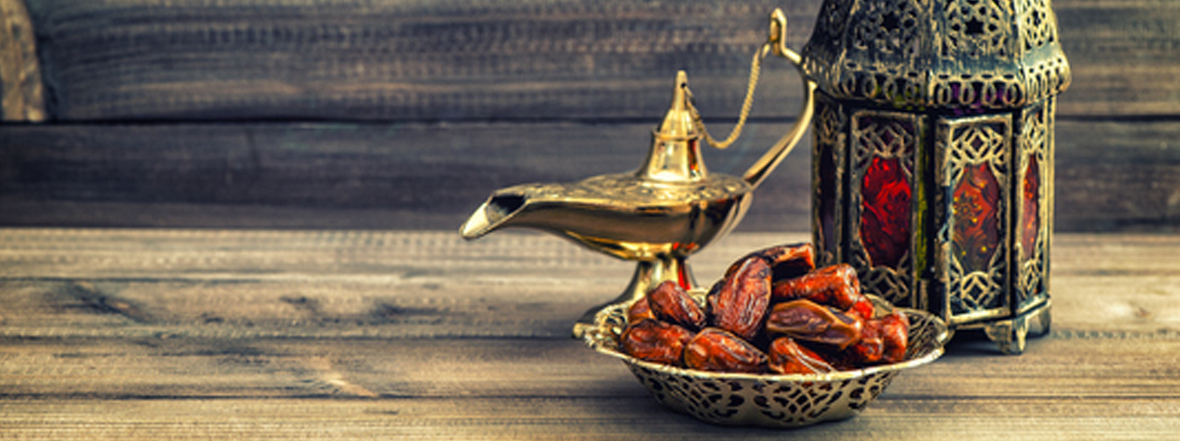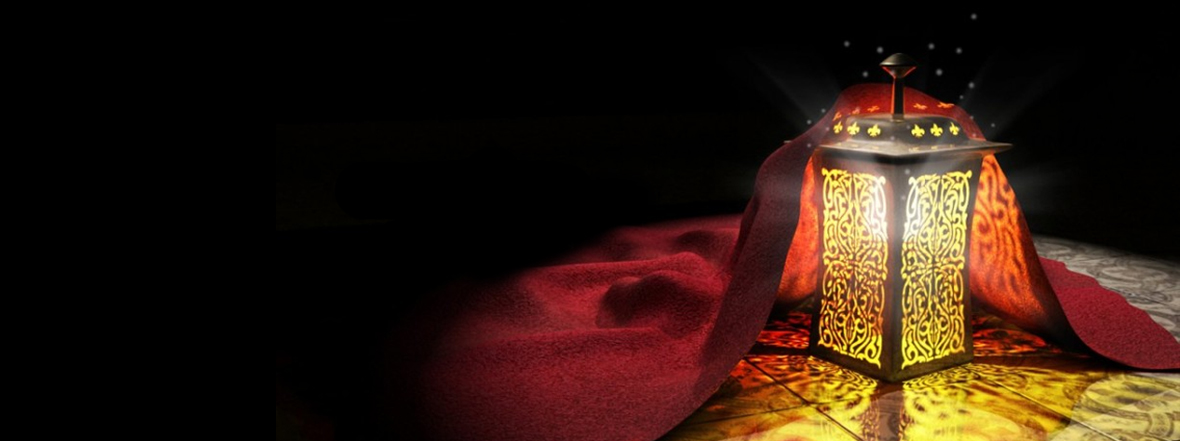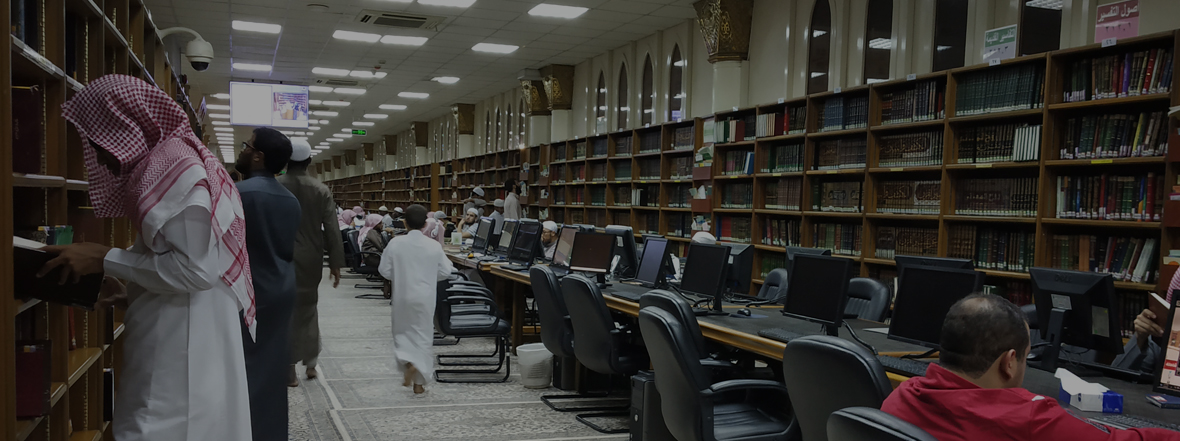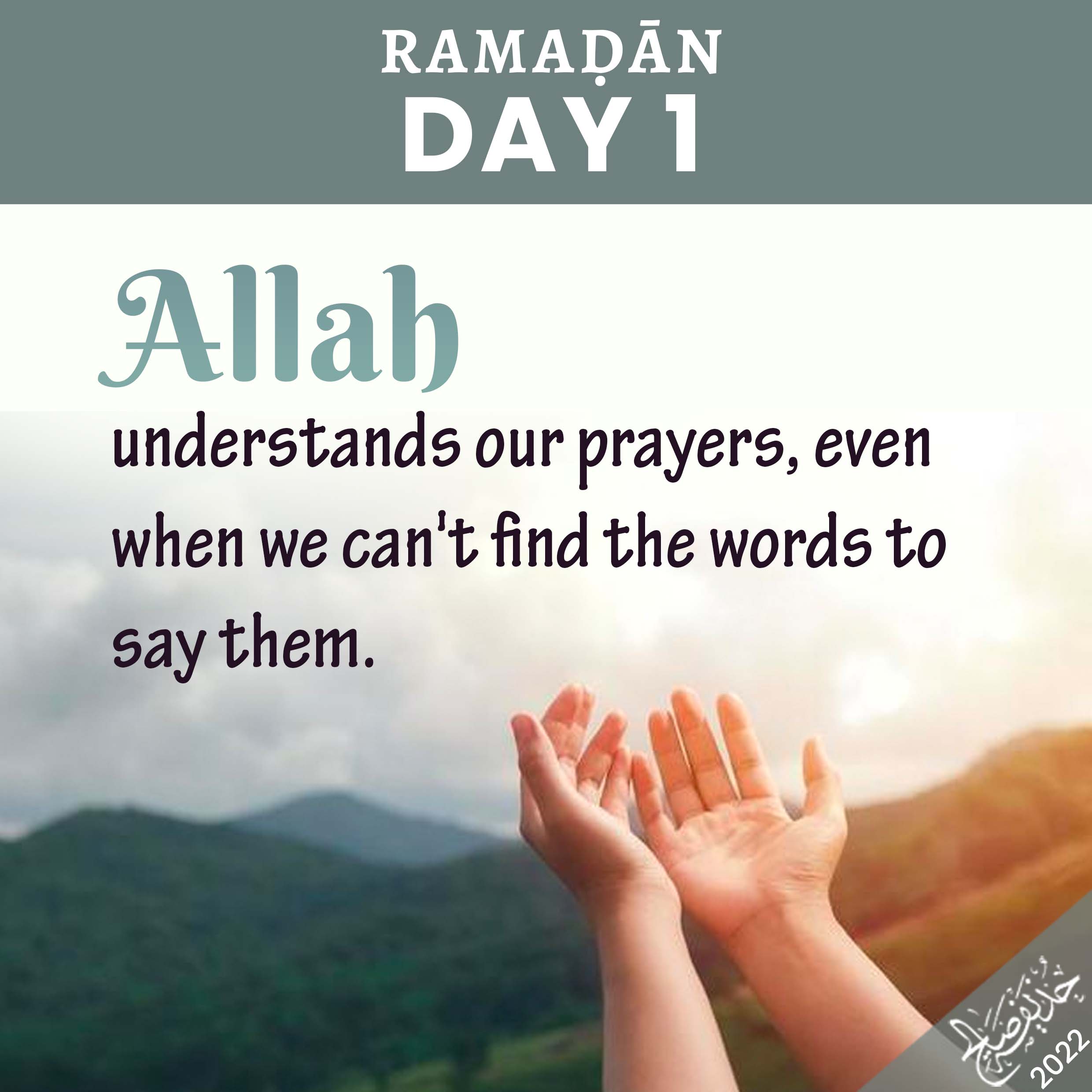
“Supplication is the essence of worship.” [Tirmidhī 3371]
Supplication (duʿā) has been called the essence of worship for two main reasons.
First, by supplicating to Allah, a person fulfils his obligation of calling on Allah, which is understood from the verse, “And your Lord says, ‘Call on Me, I will answer you (your prayer)’” (Qur’ān 40:60). This is worship in its purest form.
Second, by invoking Allah, one realizes that only He can fulfil one’s needs. The servant who calls upon his Lord abandons hope in everything else and turns his full attention to Allah, humbling himself in front of Him. This is the essence of worship. Another desired result of worship is to attain reward from Allāh. Because there is such great reward in supplication, it has been called the essence of worship.
(Mazād al-Rāghibīn, pg. 7)
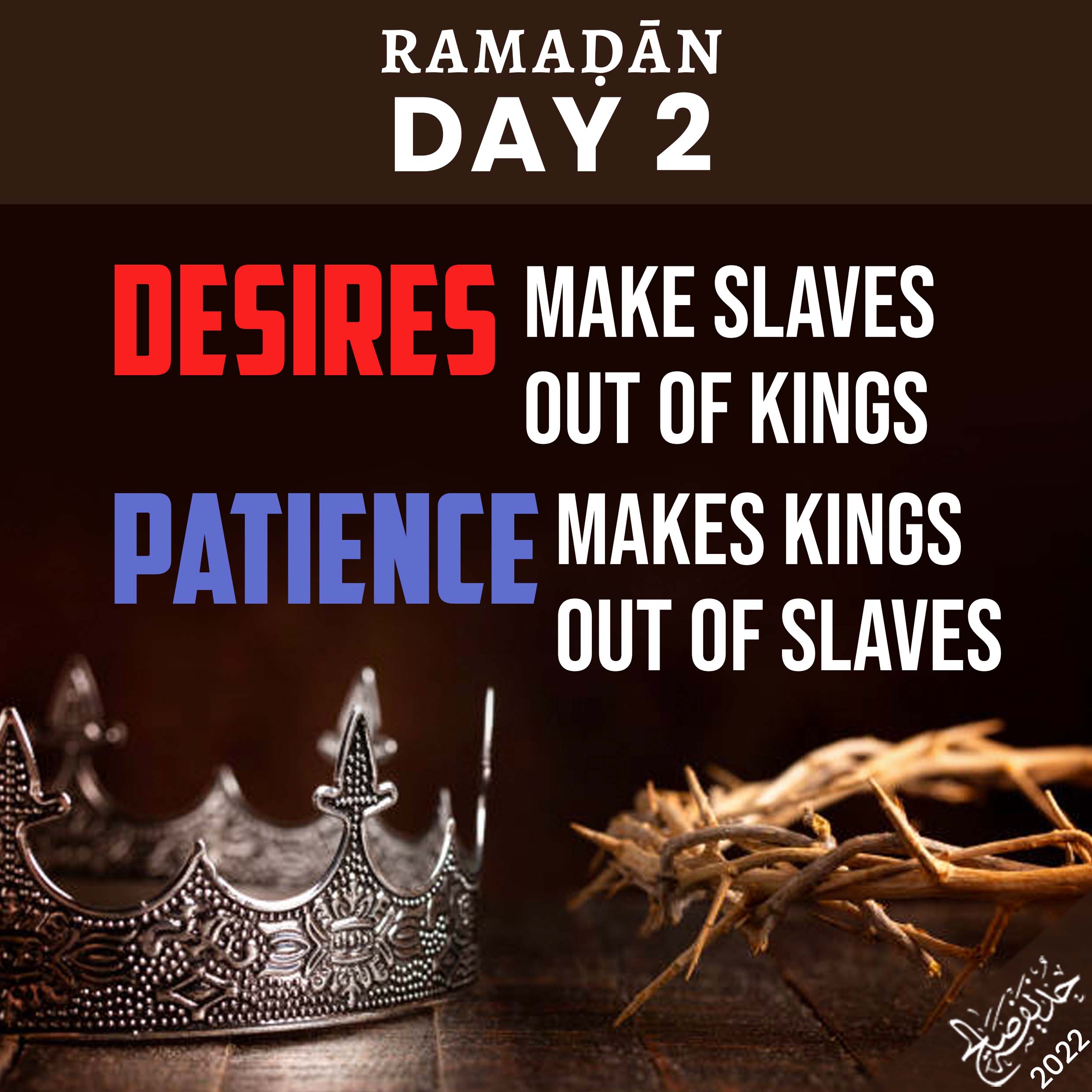
Truly, a person who favours a current pleasure, whose effect will disturb his life and Hereafter, must be a person with no sense of sensibility. For how can a person favour such pleasures that are as temporary as a dream and as short as a good moment a person spends with a character visiting him in a dream, over an everlasting pleasure that is among the ultimate pleasures!
How could a person sell all that for such mortal lowly pleasures that come with pain and are also achieved with pain and whose result is nothing but pain! If the sensible thinks of pain vis-a-vis pleasure and harm vis-a-vis benefit when thinking of such desires, he would have been ashamed of himself and his sensibility; thus he will never pursue such desires or even waste his time busying himself with it, let alone favour them over “what no eye ever saw and no ear ever heard of and nor even thought of by any person.”
Indeed, Allāh Taʿālā, Most High, has purchased from the believers their lives in exchange for that which they will have in Paradise, and established this contract through His Messenger ṣallallāhu ʿalayhi wasallam, the best of mankind whom He loves and favours the most over all other creation. Therefore, how could a sensible person neglect, waste or undermine a merchandise that the Lord of the heavens and the earth has purchased; whose price is to enjoy seeing His Noble Face and hear His Words in Paradise; not withstanding the great honour of such a contract for being established through His Messenger ṣallallāhu ʿalayhi wasallam! How could a person waste this great blessing and settle for a mortal life! Truly, this is the greatest of all loss, which will become evident to such a person on the Day of Judgment when the scales of the pious are heavy and the scales of the losers are light.
— Heartfelt advice to a friend by Imām ʾIbn Qayyim al-Jawziyyah [pg. 37]

Allāh Taʿālā mentions in the Qurʾān:
يٰۤـاَيُّهَا الَّذِيۡنَ اٰمَنُوا اذۡكُرُوۡا اللّٰهَ ذِكۡرًا كَثِيۡرًا
O those who believe, remember Allāh abundantly.
— [Qurʾān 33:41]
The instruction of remembering Allāh in abundance is given in the above verse to show gratitude for our blessings.
ʾIbn ʿAbbās raḍiyallāhu ʿanhu has stated that there is no form of worship except ذِکرُ اللہ dhikrullāh [remembrance of Allāh] for which Allāh has not fixed a limit; for example, ṣalāh is prescribed five times a day and the number of rakʿāt are determined for each ṣalāh; fasting throughout the month of Ramaḍān is determined, Ḥajj can be performed only at a particular place and at a particular time, Zakāh is prescribed once a year at a particular rate. But dhikrullāh is a form of worship for which there is no limit or defined quantity, no particular time or period, no defined posture or position, nor even the state of purity through ablution is required. Dhikrullāh is required all the time, in all circumstances, whether one is traveling or is at home, whether one is healthy or ill, whether one is on land or at sea, whether it is day or night – it is required all the time.
A Beduin said to the Prophet ṣallallāhu ʿalayhi wasallam that the number of good deeds, obligations in Islām are many; so please tell me something concise and comprehensive which I could hold on to firmly. The Prophet ṣallallāhu ʿalayhi wasallam told him,
لَا یَزَالُ لِسَانُکَ رَطْباً بِذِکْرِ اللہِ تعالیٰ
“That your tongue remains always wet with the dhikr of Allāh Taʿālā.” — [Musnad Aḥmad, ʾIbn Kathīr]
— Maʿāriful Qurʾān [Volume 7]
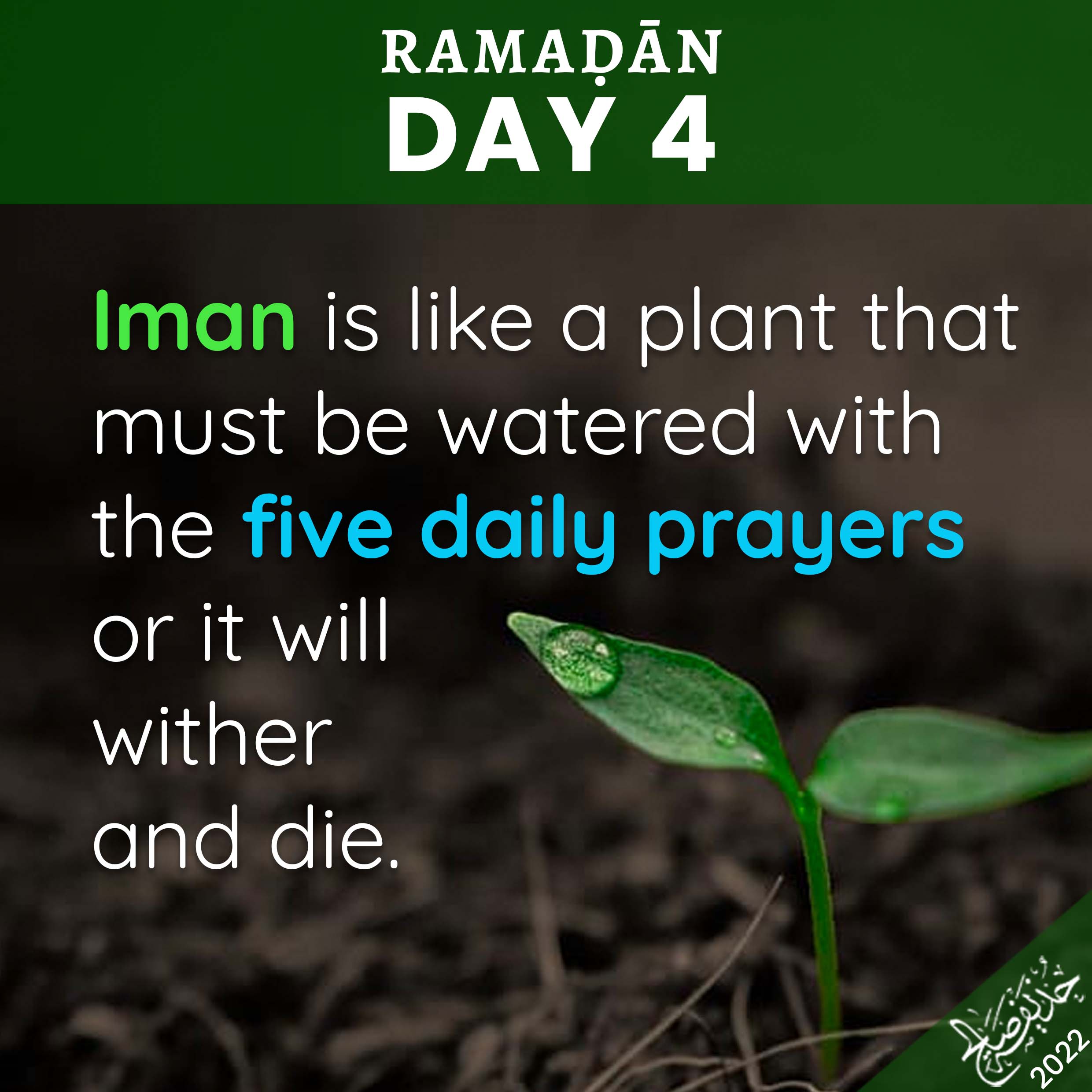
If you ever feel your heart is heavy and constrained, listen to this great verse. Allāh Taʿālā said addressing His Prophet ṣallallāhu ʿalayhi wasallam:
وَلَقَدۡ نَعۡلَمُ اَنَّكَ يَضِيۡقُ صَدۡرُكَ بِمَا يَقُوۡلُوۡنَۙ
فَسَبِّحۡ بِحَمۡدِ رَبِّكَ وَكُنۡ مِّنَ السّٰجِدِيۡنَۙ
And We know that your heart feels distressed for what they say.
So, proclaim the purity, and glory of your Lord and be among those who prostrate [to Him].
— [Qurʾān 15:97-98]
So, the treatment for sorrow, and heavy hearts is exalting Allāh with praise and performing ṣalāh.
As it was informed that the Prophet ṣallallāhu ʿalayhi wasallam:
“Whenever anything distressed the Prophet ṣallallāhu ʿalayhi wasallam, he used to pray.”
In another narration, “he hastened to pray.”
When emergency arose, when he felt sad about something or upset, directly he would return and hasten towards Allāh by offering prayers.
Who else would respond to the desperate?
Who else would expand and relieve your heart?
Who else would ease your matters and save you from sorrow?
It is only Him, Allāh, all praise be to Him.
Always, exalt Allāh, with praise.
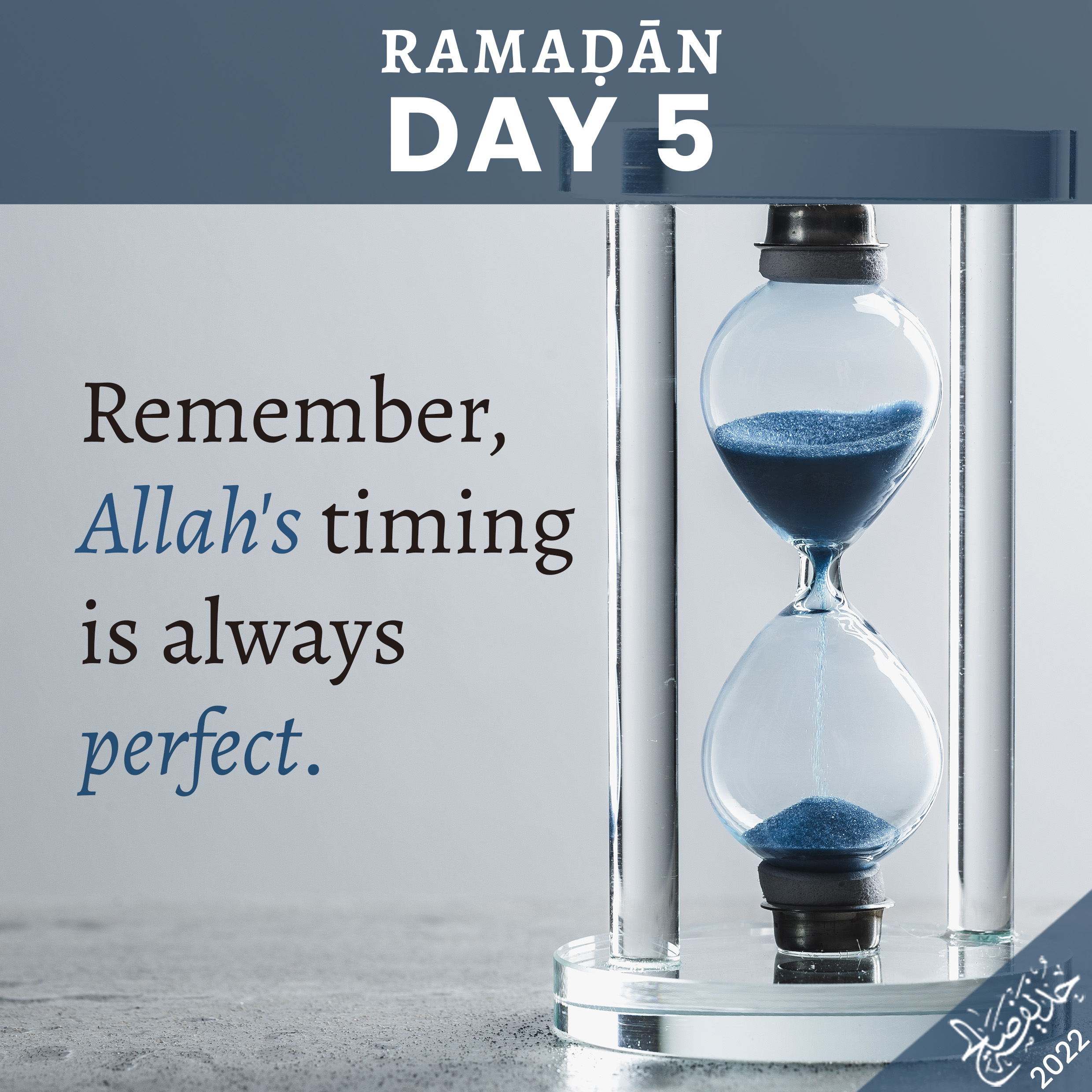
If man is so pleased with the ways and means which help make things work for him, if they were to open his eyes, he would realise that his plans and measures could neither create nor make things in the real sense. The outcome of all his efforts and workings is no more then getting to learn how to make the best use of what has been created by Allāh سبحانه و تعالى.
For example, you need to build a house. You find a whole range of servers from the architect, to the builder, to the finisher, hundreds of human beings offering their career and service, all set to answer your call. You need building materials. They lay stacked in stores and shops ready to be delivered to where you want them.
Was it within your power and control to assemble all these things on your own, by the brute force of your money or measures?
The fact is that this system of life cannot be established and activated through force of law, even by the mightiest of the mighty establishments anywhere in the world. There is no doubt about the fact that the logistic support of this viably running running universal system is the work of Allāh سبحانه و تعالى alone, the Ever-Living, the Sustainer of all.
If human beings still hasten to claim that all this comes from their plans and workings, there is not much that can be said about their claim, for ignorance shall remain what is.
[Ma’āriful Qur’ān, Volume 5, Page 185-186]
The ʿabd (servant) is subsequently prescribed to say “Allāh is the Most Great” and then to fall down in prostration to the floor to let all his limbs individually demonstrate their servitude to Allāh; his forehead placed on the floor before his Lord, his face – the most honorable part of his body – comes together with the dust on the floor, and all the while his heart humbles itself to Allāh. The arrangement of this posture is such that his lower body ends up in a higher level than his upper limbs (i.e. the face), emphasizing his submission. His heart and body are thus rendered humble and submissive before the Greatness and Glory of the Lord. Moreover, when the state of the heart conforms to the state of the body in this position (i.e. both are humble, submissive and down to earth), it is as if the heart too prostrates to Allāh along with the forehead, nose, face, hands, knees and feet. An ʿabd with such humility and submissiveness shall be among Allāh’s favoured servants. This is because the closest an ʿabd comes to his Lord is when he is in the state of prostration.
In this posture, it is prescribed for the ʿabd to not have any part of his body depend on any other part for support; that is, he should avoid placing the weight of his thighs on his legs, maintain a space between his belly and his legs, and keep a space between his arms by spreading them to the sides away from his body. This is so that each part of his physical self can individually demonstrate its slavery to Allāh. And it follows from what has been said that the slave (of Allāh) should in this posture be at the closest point to his Lord, as the Prophet Muḥammad ṣallallāhu ʿalayhi wasallam said: “The closest an ʿabd is to his Lord is when he is prostrating.”
The reality of the prostration of the heart is its submission to Allāh, and the heart is able to remain in prostration until the Day of Judgment. One of the righteous Salaf was asked: “Does the heart prostrate?” He answered: “Indeed it does, by Allāh it prostrates such that it does not raise its head even once, and remains in prostration until it meets Allāh, Exalted be He.”
[Inner Dimensions of the Prayer by Imām Ibn Qayyim al-Jawziyyah]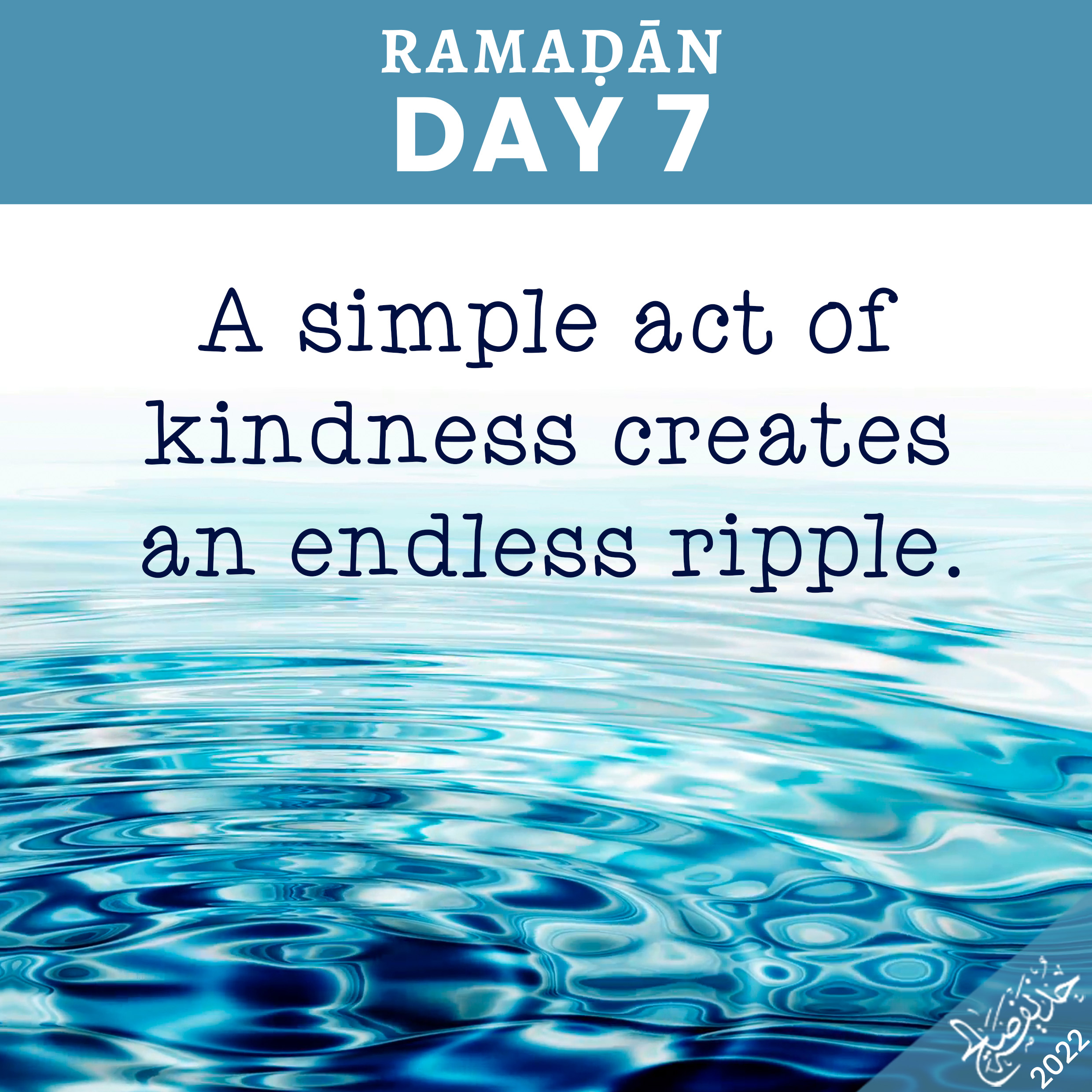 Keep putting out good. It will come back to you tenfold in unexpected ways.
Keep putting out good. It will come back to you tenfold in unexpected ways.
Our faith is all about kindness and mercy towards others. When you are kind and you spread this beauty, this affects everyone and everything around you. So keep shining as you never know when a good deed on your part may be returned many times.
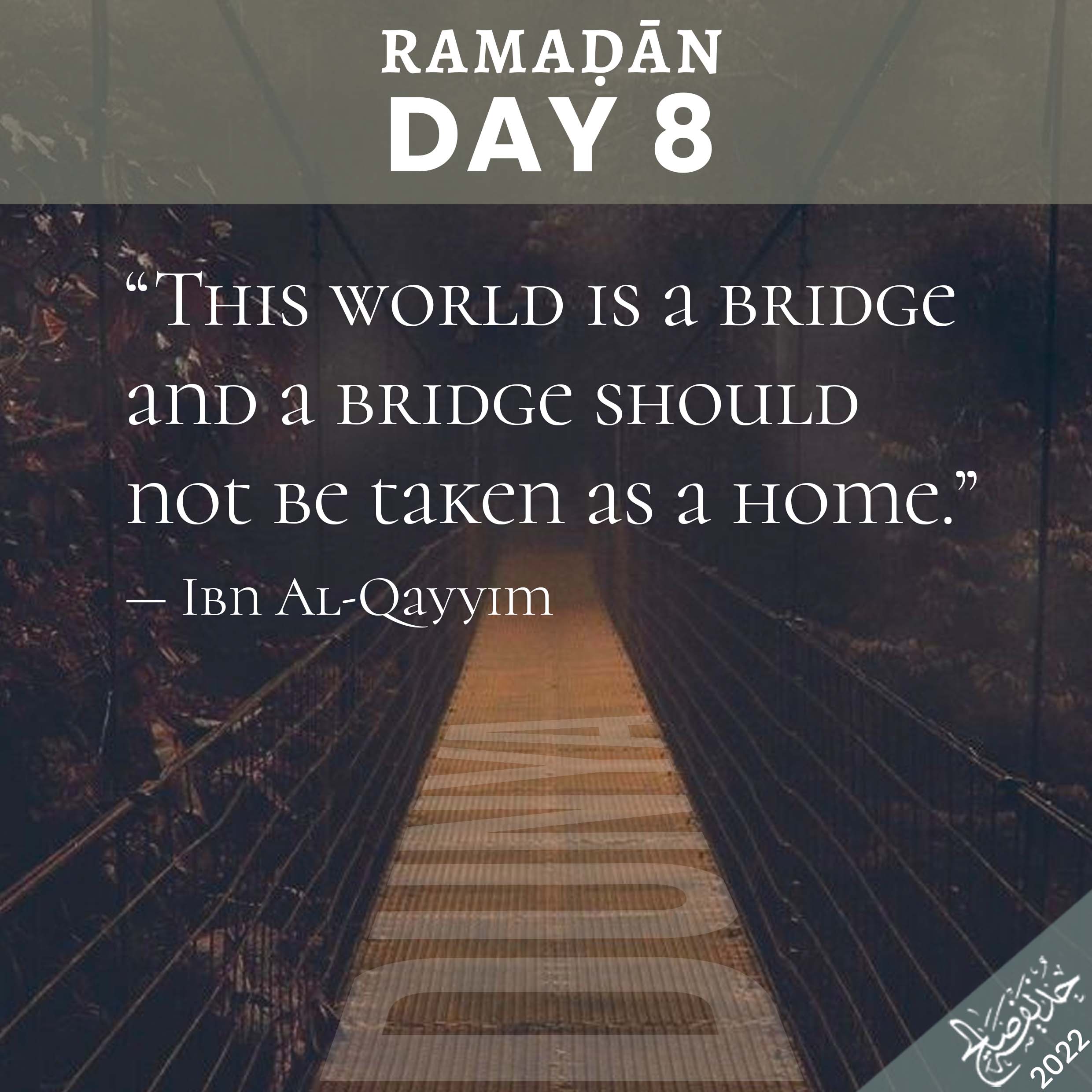
The Prophet (peace be upon him) “Be in this world as if you were a stranger or a traveller along a path.” [Sahih al-Bukhari 6416]
This is a very important hadith as it governs how we should be in this life and how we should look at it. This life is a trial, and this hadith reinforces and guides a person in how to deal with the trials of this life.
Ibn Rajab رحمه الله said, “And this hadith is a foundation in having short hopes of this life, for the believer should not take this life as a home for him that he feels tranquil in. Rather, he should be in it like he is about to leave, preparing himself for his departure, and the advice of the Messengers عليهم السلام and their followers are all in agreement with this idea.”
A few qualities of a stranger are that his main concern will be on focusing his efforts in getting to his homeland, Jannah. He is not content with residency in this life because it is not his home. This doesn’t mean he should be sad, but a believer’s apparent sadness (due to hereafter matters) is in fact his happiness. We are content with the decree of Allāh, but are not content with staying in this dunya.
Ibn Rajab رحمه الله said, “When Allāh created Ādam عليه السلام, Allāh placed him and his wife in Jannah. Then, they were taken down from Jannah, and promised to return to it along with the righteous from their offspring. Hence a believer is always longing and yearning to return to his first (and original) home.”
Understand the reality of this life and that it is very lowly. Being a stranger comes naturally to whoever is following teachings of the Quran and Sunnah correctly. A believer should live as if he will die tomorrow but plan as if he will live for long. Look at the ill people around you and take heed from their illness and focus on doing more good while you are still healthy.
Understand that your true home is Jannah and you are now here on a trip towards Jannah – InshāAllāh – so ensure you follow the right path so you can reach your goal, and do not waste your time taking with you unnecessary items that will only slow you down and push you further away from real home.
أللهم إني أسألك الجنة و أعوذ بك من النار
 Islām teaches us to be merciful to the entire creation, to Muslims and non-Muslims, to friends and enemies and even to the animals. Mercy (raḥmah) in Islām has a very wide meaning that includes kindness, compassion, love, tolerance, patience with people, and to treat others the way we would love to be treated. This is at the core of the prophetic message and meaning of faith, just as it was in all of the revealed religions before Islām. Every Muslim needs to strive to be an agent of mercy on earth for all human beings and creatures.
Islām teaches us to be merciful to the entire creation, to Muslims and non-Muslims, to friends and enemies and even to the animals. Mercy (raḥmah) in Islām has a very wide meaning that includes kindness, compassion, love, tolerance, patience with people, and to treat others the way we would love to be treated. This is at the core of the prophetic message and meaning of faith, just as it was in all of the revealed religions before Islām. Every Muslim needs to strive to be an agent of mercy on earth for all human beings and creatures.
Allāh intends for the mercy of Islām to touch every person on earth. It is not as some have claimed, that Islām is only merciful to Muslims. Rather, Islām teaches us to be mercy to the entire world and everyone in it.
The Messenger of Allāh صلى الله عليه و سلم said:
لَنْ تُؤْمِنُوا حَتَّى تَحَابُوا أَفَلا أَدُلُّكُمْ عَلَى مَا تَحَابُونَ عَلَيْهِ
You will never have true faith until you love each other. Shall I tell you what will make you love each other?
They said, “Of course, O Messenger of Allāh صلى الله عليه و سلم.”
The Prophet صلى الله عليه و سلم said:
أَفْشُوا السَّلامَ بَيْنِكُمْ فَوَالَّذِي نَفْسِي بِيَدِهِ لا تَدْخُلُونَ الْجَنَّةَ حَتَّى تَرَاحَمُوا
Spread peace between yourselves. By the one in whose hand is my soul, you will not enter Paradise until you are merciful to others.
They said, “O Messenger of Allāh صلى الله عليه و سلم, all of us are merciful.”
The Prophet صلى الله عليه و سلم said:
إِنَّهُ لَيْسَ بِرَحْمَةِ أَحَدِكُمْ خَاصَّتَهُ وَلَكِنْ رَحْمَةُ الْعَامَّةِ
Verily, it is not only mercy between yourselves, but rather it is mercy in general.
[al-Sunan al-Kubrā lin-Nasāʼī]
Not only should we be merciful to human beings, but also to animals. All of Allāh’s creatures have rights in Islam, plants, humans and animals, so it is the duty of Muslims to uphold, and protect their natural rights.
الرَّاحِمُونَ يَرْحَمُهُمْ الرَّحْمَنُ ارْحَمُوا مَنْ فِي الْأَرْضِ يَرْحَمْكُمْ مَنْ فِي السَّمَاءِ
The Messenger of Allāh صلى الله عليه و سلم said, “Those who are merciful will be shown mercy by the Most Merciful. Be merciful to those on the earth and the One in the heavens will have mercy upon you.”
[Tirmidhī]
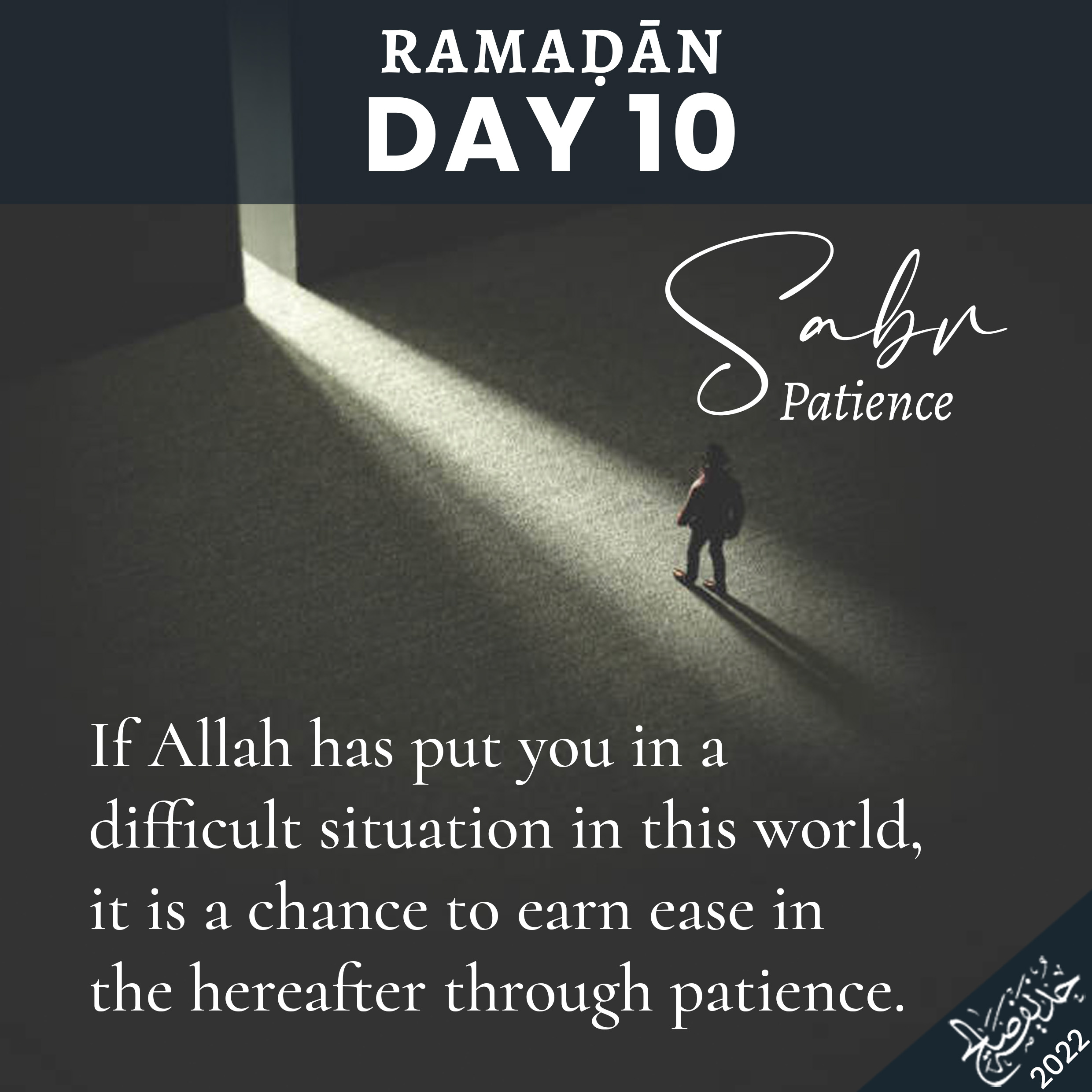
“Let not a delay in the timing of a gift [response to your prayers] – despite persistence and firm continuance in making du’a – be a cause of despair. For Allāh has promised you a response, “Call upon Me and I will respond to you” (40:60) – in the time that Allāh chooses and not you. For He knows what is better for you than you do. Allāh has guaranteed you a response in the time that Allāh chooses, not in the time of your choice.
An author writes, “Sometimes Allāh gives while depriving you, and sometimes Allāh deprives while giving to you.” Sometimes, Allāh’s withholding from you is, in reality, a form of giving.
Ḥaḍrat Mūsā عليه السلام made a du’ā to Allāh against Fir’aun and his followers (Qur’ān, 10:88) which got answered 40 years later. Not straight away. Why? Because Allāh has perfect timing and only Allāh knows best when that is.
Maybe Allāh is delaying a response to your prayers because Allāh loves to hear your voice whilst calling out to Him.
Maybe Allāh is delaying a response because Allāh wants you to reach a certain status in Jannah which you can’t achieve just by your deeds so Allāh is testing you in different ways so you may become successful.
Patience and avoiding hastiness befits the servant. Do not lose hope in your du’ās as they are a weapon of a believer.
The Messenger of Allāh ﷺ has said: “The du’ā of any one of you will be answered so long as he is not impatient and says, ‘I made du’ā but it was not answered.” [Ṣaḥīḥ Muslim]
Allāh has perfect timing; never early, never late. It takes a little patience and faith, but it’s worth the wait.

Say (O Prophet ﷺ), ‘If you love Allāh, then follow me. Allāh will love you and forgive you, your sins. And Allāh is the Most-Forgiving, Very-Merciful.’ Say, ‘Obey Allāh and the Messenger.’ Then should they turn back, Allāh does not love the disbelievers.
[Quran, Surah Imran (3), verse 31-32]
Affirmed in these verses is the belief in the Messenger as well as the need to follow the Messenger ﷺ so that we stand informed that the rejection/refusal to obey the Prophet ﷺ is an act of disbelief.
Love is something secret. Whether or not a person loves another person, or loves less or more, are questions which cannot be answers precisely. There is no measure to determine the truth of the matter except that one makes an educated guess based on visible conditions and dealings, for love leaves traces and signs which could help in recognising it as such. Now, in these two verses, Allah ﷻ, tells those who claimed that they love Allāh and hoped to be loved by Him (ﷻ), above is the real criteria of His (ﷻ) love. In other words, if a person living in this world today claims that he loves his Creator then he must test it on the touch-stone of his obedience to the Messenger of Allāh ﷺ, that is to match it against the frequency and quality of where and how he has been following the Messenger ﷺ. How true a person turns out to be in his claim will be visible from how much he makes it a point to follow the Noble Messenger ﷺ. Using the guidance brought by him ﷺ (the Sunnah), as the guiding force in his life.
Rasūlullāh ﷺ has said: He who has obeyed Muḥammad ﷺ, has obeyed Allāh. And he who has disobeyed Muḥammad ﷺ, has disobeyed Allāh.
[Maʿāriful Qur’ān, Volume 2, Page 61-62]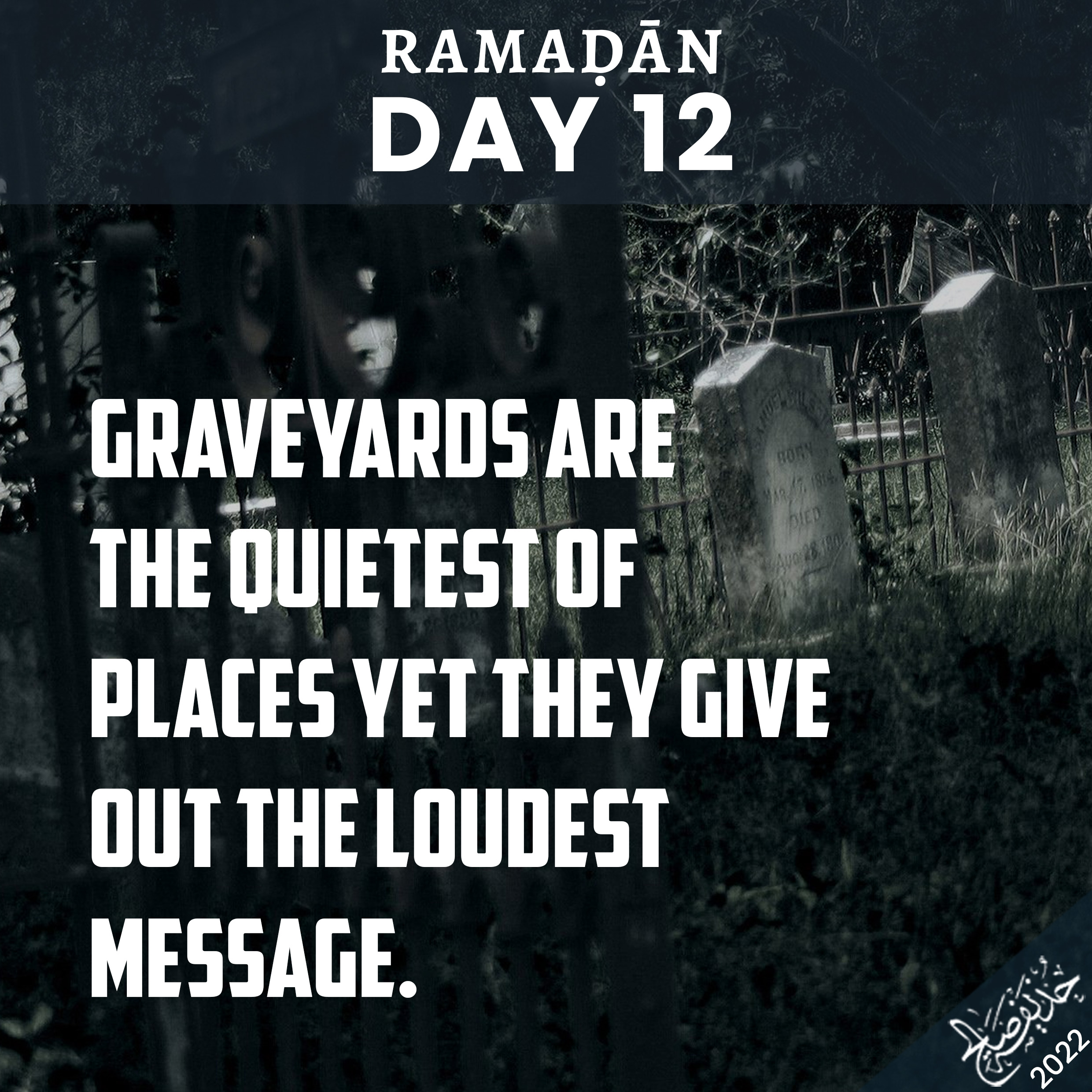 Every person will taste death. There’s no doubt about it. We were not made for this world. We were all made for the hereafter. This life is merely a passing place waiting for our real destination – in Jannah, InshāAllāh.
Every person will taste death. There’s no doubt about it. We were not made for this world. We were all made for the hereafter. This life is merely a passing place waiting for our real destination – in Jannah, InshāAllāh.No one can or will escape death. No matter how wealthy and brave you may be. [Wherever you will be, death will overtake you, even if you are in fortified castles. (Qur’ān, Sūrah An-Nisā (4), verse 78)]
While life and death are from Allāh, we have to remember that they are to take place with the permission of Allāh alone. Each one’s life and death is decided by Allāh. You will and are going to return to your Lord. That is definite. What isn’t definite for us is when that will happen. Therefore, it shouldn’t be a trait of a Muslim to be afraid of death, despite all possible defences one may arrange for himself. – Try your best in this world. Allāh will never let your efforts will never go to waste.
Without entering in this world and without leaving this world, we cannot enter Jannah, which is our ultimate goal. We can’t have hope and always pray for the highest of Jannah without tasting death. Death is the only truth this life can promise us. It is a passage to Paradise. Just as you pass through a door and you end up on the other side, or in another room. Similarly, death is a door, you leave this world, and enter into the hereafter. Therefore, it is important that we all remember the death constantly and try our best to prepare for it.
Ḥaḍrat Āishah رضي الله عنها asked the Messenger of Allah ﷺ, “O Messenger of Allāh (ﷺ), shall anyone be resurrected alongside the martyrs?” The Messenger of Allah ﷺ replied, “Yes. He who recalls death 20 times in one day and night.”
[The Remembrance of Death and the Afterlife, Imām Al-Ghazālī رحمه الله, page 9]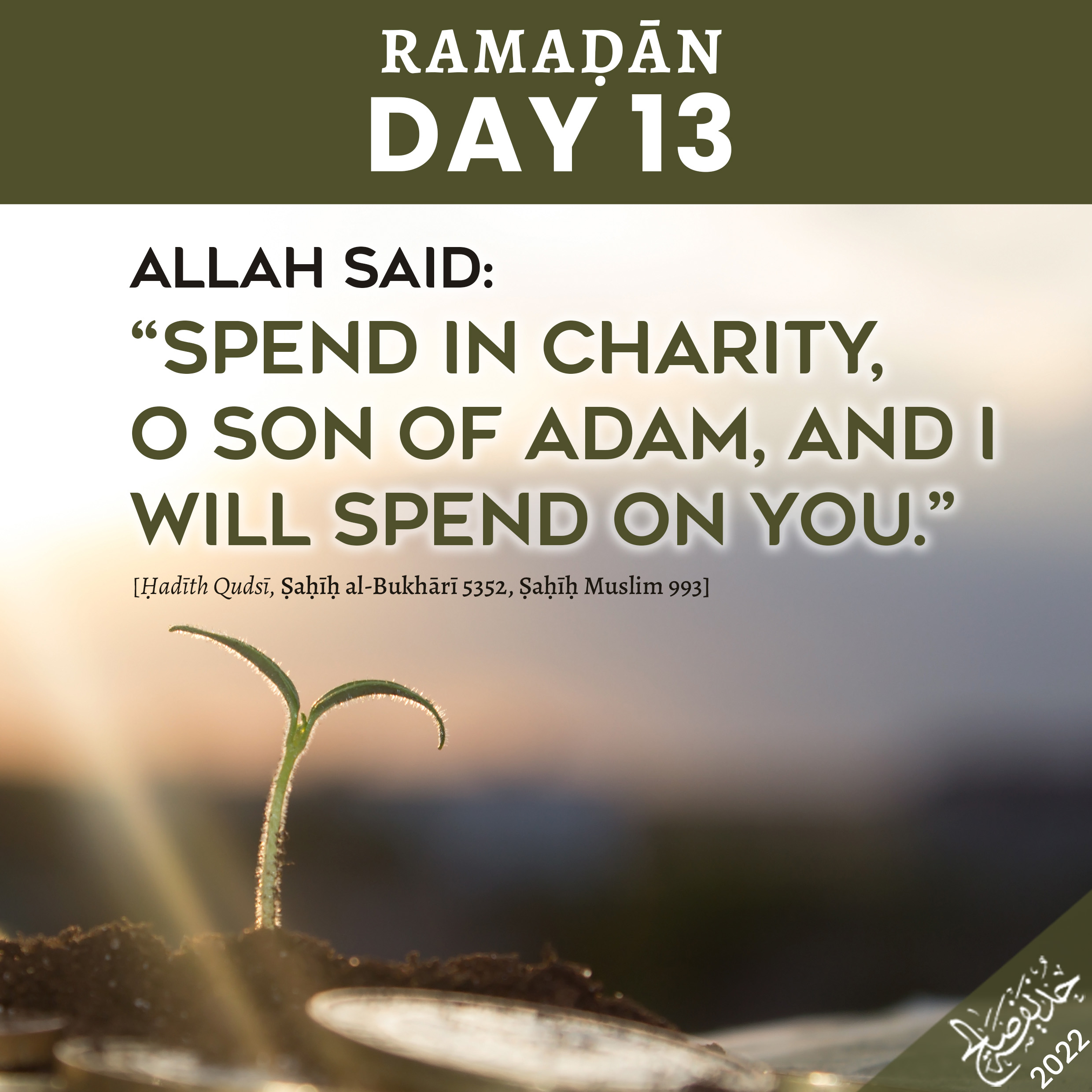
For anything that you spend, Allāh ﷻ gives you a return from His unseen treasures – at times, within this world and at times, in the Hereafter and at times, in both.
We see that water comes down from above, animals and humans use it freely, needs of farms and forests are satiated, and no sooner does that supply of water finish, then another supply descends to replenish it. Similar is the case of wells dug for water that, no matter how much water is spent out of these, it stands replenished by nature from other sources of water beneath the bed.
Man eats up his food leaving the impression that he has finished it, but Allāh provides him with other food in its absence. In short, whatever man spends out in this world, it is the practice of Allāh that Allāh would replace it with something else similar to it.
According to a Ḥadīth of Ḥaḍrat Abū Hurairah رضي الله عنه in Ṣaḥīḥ Muslim, the Prophet ﷺ said, “Everyday when people rise to see another morning, two angels descend from the heavens and pray: O Allāh, bless the one who spends [out of what You gave] with its return, and let the one who withholds [what You gave] find it wasted.”
There is no promise of a return for spending that which is not spent in accordance with the Sharīʿah.
Ḥaḍrat Jābir رضي الله عنه reported the Prophet ﷺ said, “Good deed is sadaqah. When someone spends on himself or his children and family, that spending too falls under sadaqah. It brings reward. One who spends to protect his integrity and honour, this too is sadaqah. Whoever spends whatever he does in obedience to the command of Allāh, Allah has taken it upon Himself that He will give him its return except that which is spent in (wasteful, extra to need) building or sinful activity, for there is no promise of a return for it.”
After hearing this from Ḥaḍrat Jābir رضي الله عنه, his disciple, Ibn al-Munkadir asked, “What is the meaning of spending to protect one’s honour?” He said, ‘There may be a person about whom one apprehends that, should he not give him something, he would go about insulting him in all sorts of ways. Hence, giving to such a person is in order to save one’s honour.” [Dāraquṭnī][Maʿāriful Qur’ān, Volume 7]
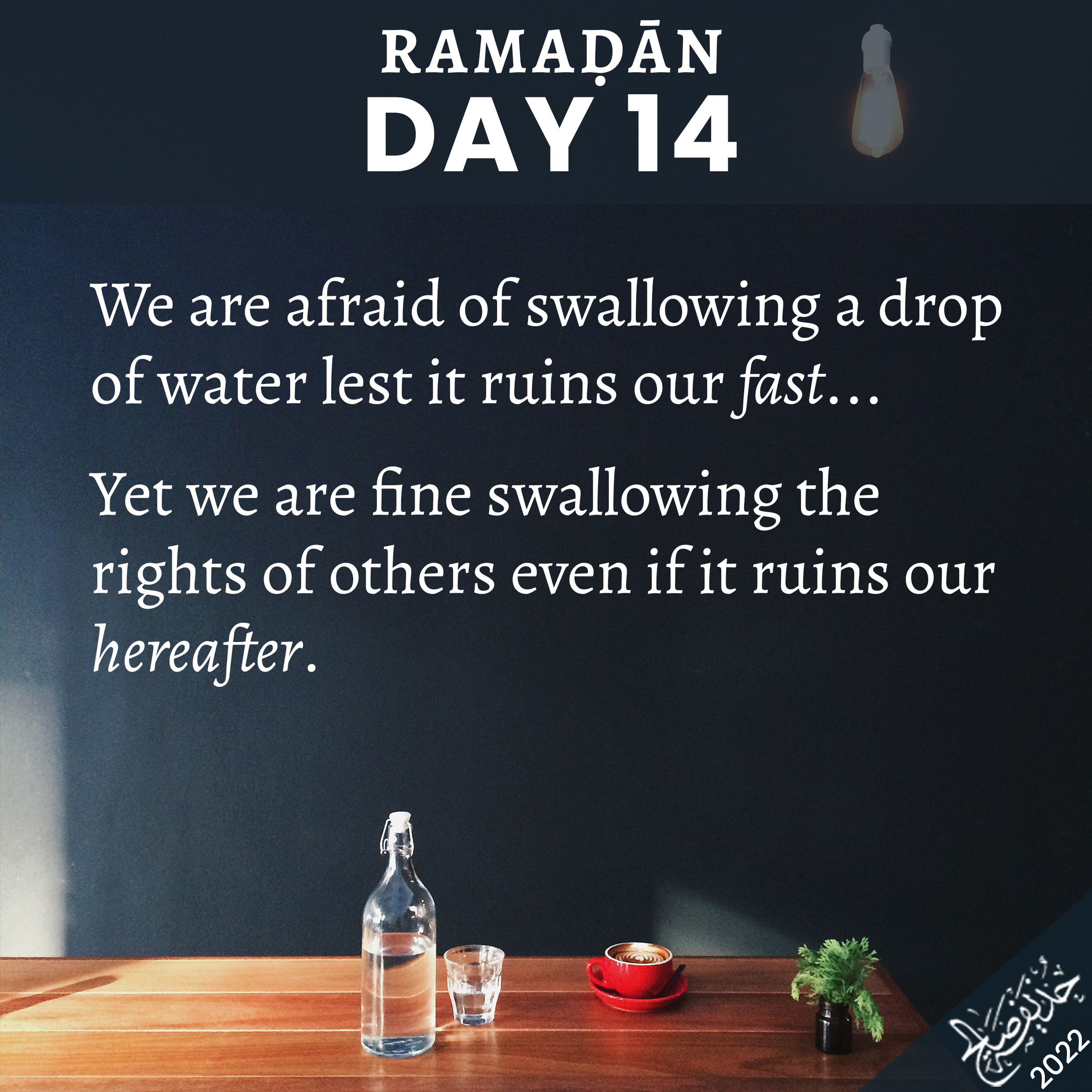
There are rights that are owed to Allah (Ḥuqūqullah) and rights which are owed to the servants of Allah (Ḥuqūq al-ʾIbād).
Examples of the Rights of Allah are: Falling short in the duties and obligations like Ṣalāh, Ṣawm, Zakāh and Ḥajj. And the examples of the Rights of the Servants of Allah are: Usurping someone’s property unlawfully, to attack someone’s honour, and to cause pain to someone by using bad language or causing such pain in some other manner.
Therefore, for repentance to be complete, the way it is necessary to first feel ashamed of the past sin, then seek forgiveness from Allah, then resolve to keep one’s conduct correct and straight in the future and never go near that sin again – similarly, it is also necessary that the prayers and fasts which were missed due to heedlessness should be replaced by doing Qaḍāʿ for them. Then, any Zakāh which has not been paid earlier should be paid now. If there is a shortcoming in taking care of what was obligatory in Qurbani or Sadaqat ul-Fiṭr, that should be paid off. In short, for ‘the correction of deed,’ the correction of the future conduct only is not enough – it is also necessary to make amends by paying off for obligations left unperformed in the past.
Similar is the case of the Rights of the Servants of Allah (Ḥuqūq al-ʾIbād). If someone’s property has been taken unlawfully, it should be returned to him, or have him forgive it. And if someone has been caused pain physically or verbally, forgiveness must be sought from the aggrieved person. And if, it is not possible or within one’s control to have him forgive it – for example, he dies; or goes away to a place the address of which is not known – then, the way out is that one should make it a point to keep praying for his forgiveness before Allah consistently. If so, it can be hoped that the holder of the right will be pleased and the person who was unable to have the forgiveness of the deceased during his lifetime will become absolved of what was due on him.
[Adapted from Maʿāriful Qur’ān verses 6:54 to 6:55]
Al-Shāfiʾī, may Allah be pleased with him, said: “I accompanied the Sufis and I only benefited from two of their sayings. First, ‘Time is a sword; if you do not slay it, it will slay you.’ And the second: ‘Keep your soul occupied with good, otherwise it will keep you occupied with evil.'”
One’s time is in fact one’s life, and the substance of one’s eternal life in lasting pleasure or of a life of suffering in severe torment. It passes faster than the passing of clouds, and the portion of one’s time that was for Allah and with Allah is part of one’s life, while the rest is not counted as part of one’s life even if one lived long, for one was living the life of animals. For the one who spends his time in negligence, desires and false wishes, and spends most of his time in sleeping and idleness, then the death of such a person is better for him than his life. And if one has of one’s prayer only that part in which one was conscious, as in the hadith, then similarly what counts of one’s life for one is only that which was spent for Allah and with Allah.
[The Value of Time, Shaykh ‘Abd Al-Fattāḥ Abū Ghuddah, pg. 8]
Ibn al-Mubārak رحمه الله had a Jewish neighbor. He would always feed him before feeding his own children and would provide clothing for him first and then for his children. Some people said to the Jewish neighbour, “Sell us your house.” He answered, “My house is for 2000 dīnārs. 1000 is for the house and 1000 is for having Ibn al-Mubārak as a neighbor!” Ibn al-Mubārak heard of this and he exclaimed, “O Allāh, guide him to Islām.” By the permission of Allāh, he accepted Islām.
On another occasion, Ibn al-Mubārak رحمه الله passed by a caravan of people who were travelling to make the pilgrimage to Makkah. He too was on his way to do the same. He saw one of the women take a dead crow from a cesspit. He sent his servant to inquire about this and when he asked her, she replied, “We have had nothing for three days except that which finds its way into it.” When Ibn al-Mubārak رحمه الله heard of this, his eyes swelled with tears. He ordered for all of his provision to be distributed among those of the caravan, and having nothing with which to continue the journey, he returned to his home and gave up making the pilgrimage for that year. Later, he saw someone in a dream saying, “Your pilgrimage has been accepted, as have your rites; and your sins have been forgiven.”
No one regrets having done well even if he was extravagant in doing so. Regret is only for the mistake or for the wrong done, even when that wrong is a minor one. Good manners lead to prosperity, while bad ones lead to misery.
Nabī ﷺ said: Through good manners, one reaches the status of the person who not only fasts but who also stands late in the night to pray.
Nabī ﷺ also said: Shall I not inform you of the most beloved to me and the closest to me on the Day of Resurrection: Those of you who are best in manners.
[Don’t be sad, ʿĀ’id al-Qarni, Page 125-7/194]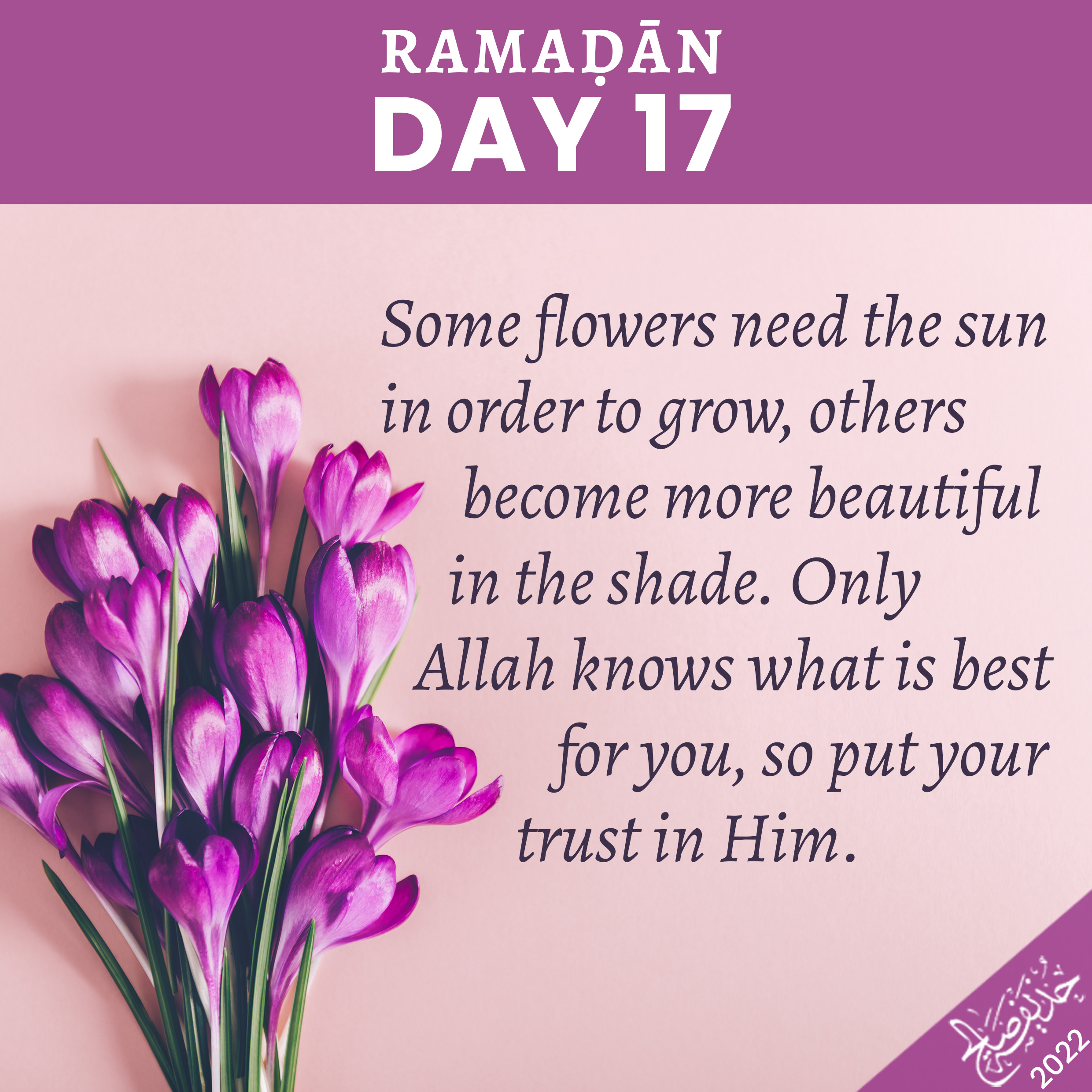
A basic element of belief in the Oneness of Allāh is understanding that Allāh manages all affairs and is able to do all the things; Allāh is the Creator, the Sustainer, the Lord and Master of the universe. As such, Allāh knows better about every individual’s best interest than them individuals themselves. Understanding this helps people to humbly submit to Allāh and to hand their affairs over to Allāh, relying upon Allāh for all their needs. Human beings recognise that Allāh will take care of the one who trust Him and has complete confidence in Allāh’s promise.
Reliance upon Allāh means entrusting one’s affairs to Allāh and relying upon Allāh for the matter at hand as well as all other matters, whether religious or worldly. This is a sign of one’s faith in Allāh and evidence for one’s belief in and implementation of tawḥīd. Relying upon others when only Allāh can help is considered to be a form of shirk.
During times of trauma and difficulty, reliance upon Allāh entails employing the means created by Allāh that are likely to lead to the desired outcome, as long as they are within the limits of the Sharʿīah. At the same time, one should trust in and depend upon Allāh and upon Allāh’s mercy, power and ability to do things. Those who rely upon Allāh do not abandon the means to achieve the end result, nor do they abandon hope in Allāh’s mercy and rely upon themselves instead.
Disregarding the means contradicts the example of the Prophet ﷺ.
Complete reliance upon the means is also a form of shirk. The two – seeking the means and trust in Allāh – must be combined to achieve the most beneficial results, both for this life and for the hereafter.
Relying upon Allāh is an act of worship of the heart. It encompasses the understanding that, in reality, there is no helper except Allāh. We may consult others, ask others for their assistance and even pay for their services, but in the end, the only true help comes from Allāh and Allāh is the only One who can save us from the predicaments in which we find ourselves.
[The Prick Of A Thorn, Dr Aisha Utz, Page 181-183]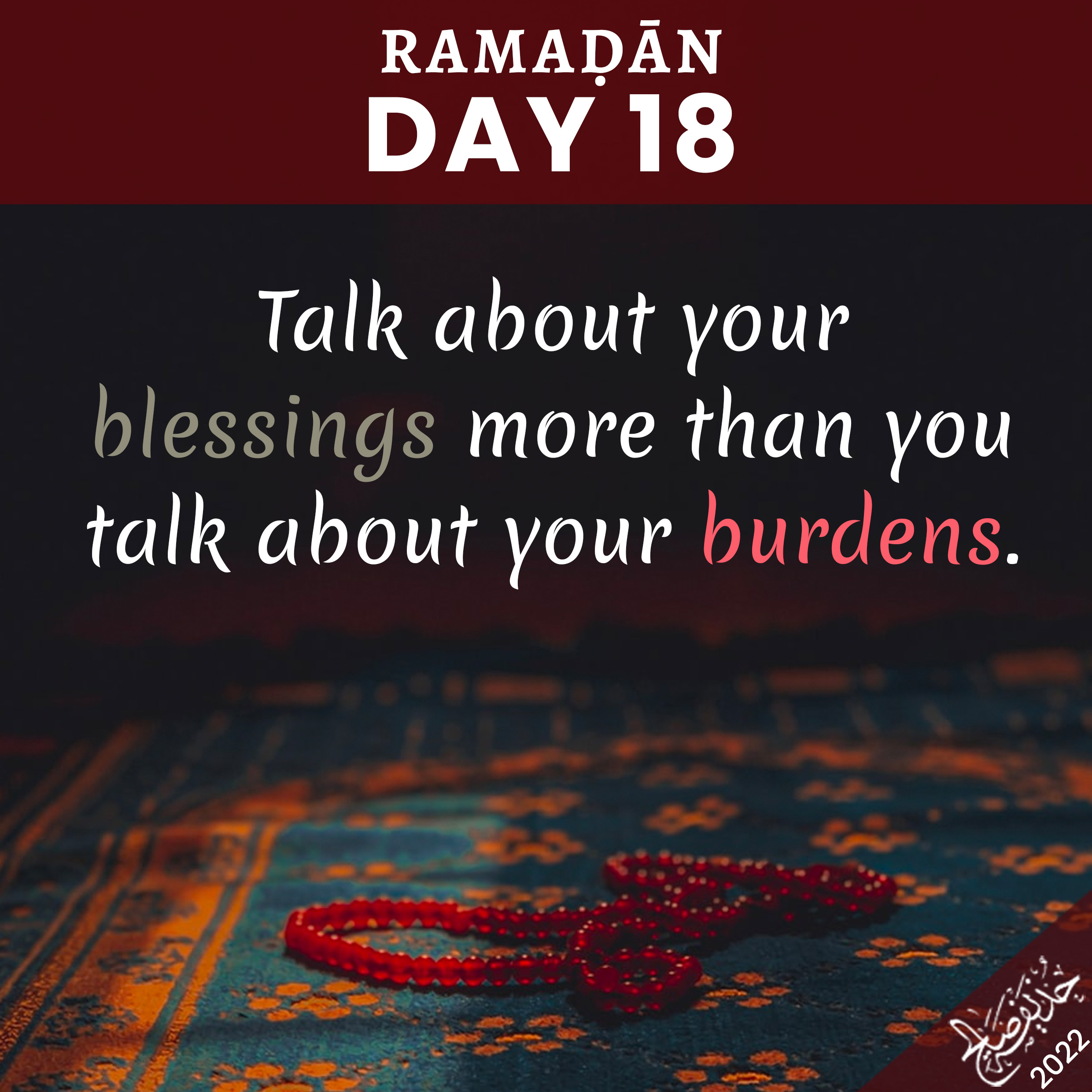
Most Scholars of the early generations were poor; needless it is to say, then, that they did not have beautiful houses or nice cars. Yet, despite this, they led fruitful lives, and they benefited mankind, not by some miracle, but because they used all that they were given, and spent their time in the correct way. Hence they were blessed in their lives, their time, and their talents.
On the contrary, there are many people who have been bestowed with wealth, children, and all forms of blessings, yet these blessings have been the very reason for their misery and ruin. They deviated from what their inborn instincts were telling them, namely, that material things are not everything.
If you’re a seeker of happiness, be satisfied with what Allāh has favoured you with. Certain educators go further than this by saying that you should imagine being contented with even less than you actually have now.
Your value is in your abilities, good deeds, manners, and contributions to society. Do not feel grief over that which has passed you by in life but be content with what Allāh has given you.
Remind yourself of Paradise, which is as wide as the Heavens and the Earth.
lf you’re hungry in this world, if you are sad, ill or oppressed, remember the eternal bliss of Paradise. lf you do, then your losses are really profits and the hardships you face are really gifts.
The most wise of people are those who work for the Hereafter, because it is better and everlasting. The most foolish of mankind are those who see this world as their eternal abode – in it reside all of their hopes. You will find such people to be the most grief-stricken of all when faced with calamity. They will be the most affected by worldly loss simply because they see nothing beyond the insignificant lives that they lead.
The happiness of Paradise will be absolute. So why do we not contemplate this fact? Paradise is our destination – and we ask Allāh سبحانه و تعالى for the highest of Paradise.
سَلَامٌ عَلَيْكُمْ بِمَا صَبَرْتُمْ فَنِعْمَ عُقْبَى الدَّارِ
“Peace be upon you for what you patiently endured. And excellent is the final home.”
[Qur’ān, Sūrah Ra’d (13), verse 24]
Khulayd al-ʿAṣarī said, “Every lover desires to meet his beloved, so love your Lord and travel to Him with a fine journey: neither arduous nor lax. This journey will take the believer to his Lord and whoever does not know the path to his Lord will not traverse it and there is no difference between such a person and an animal.”
[Abū Nuʿaym, vol.2, p.232]
Dhū’l-Nūn said, “The lowly are those who do not know the path to their Lord and nor do they seek to know it.”
[Ibid, vol 9, p.372]
The path to Allāh ﷻ is to traverse His Straight Path with which Allāh sent His Messenger ﷺ and for which Allāh ﷻ revealed His Book. It is this Path that Allāh ﷻ commanded the whole of creation to traverse.
Ḥaḍrat Ibn Masʿūd رضي الله عنه said, “The Straight Path: Muḥammad ﷺ left us on one end of it and the other end is in Paradise. To its right and left are paths branching off on which stand people summoning those who pass by them. Whoever takes to those paths will end up in the Fire but the one who remains on the Path will end up in Paradise.” Then he recited:
وَ أَنَّ هَٰذَا صِرَاطِي مُسْتَقِيمًا فَاتَّبِعُوهُ ۖ وَ لَا تَتَّبِعُوا السُّبُلَ فَتَفَرَّقَ بِكُمْ عَن سَبِيلِهِ ۚ ذَٰلِكُمْ وَصَّاكُم بِهِ لَعَلَّكُمْ تَتَّقُونَ
And, [moreover], this is My path, which is straight, so follow it; and do not follow [other] ways, for you will be separated from His way. This has He instructed you that you may become righteous.
[Qur’ān, Sūrah Anʿām (6), verse 153][The journey to Allāh ﷻ, Ibn Rajab al-Ḥanbalī رحمه الله]

Imām al-Qurṭubī رحمه الله has said:
The event relating to Sayyidnā Yaʿqūb عليه السلام proves that it is wājib upon every Muslim when faced with distress or pain in the case of his person, children, family or property that he or she should seek redress from it by resorting to patience (ṣabr) at its best and by becoming resigned to and content with the decree of Allāh Taʿālā – and follow the example of Sayyidnā Yaʿqūb and other blessed prophets عليهم السلام.
Ḥaḍrat Ibn ʿAbbās رضي الله عنه has said: Allāh Taʿālā conferred upon Sayyidnā Yaʿqūb عليه السلام the reward of Shuhadā’ (martyrs in the path of Allāh) for his ṣabr. And, in this Ummah too, whoever observes patience whilst in distress shall receive a similar reward.
[Maʿāriful Qur’ān, Volume 5, Page 144-145]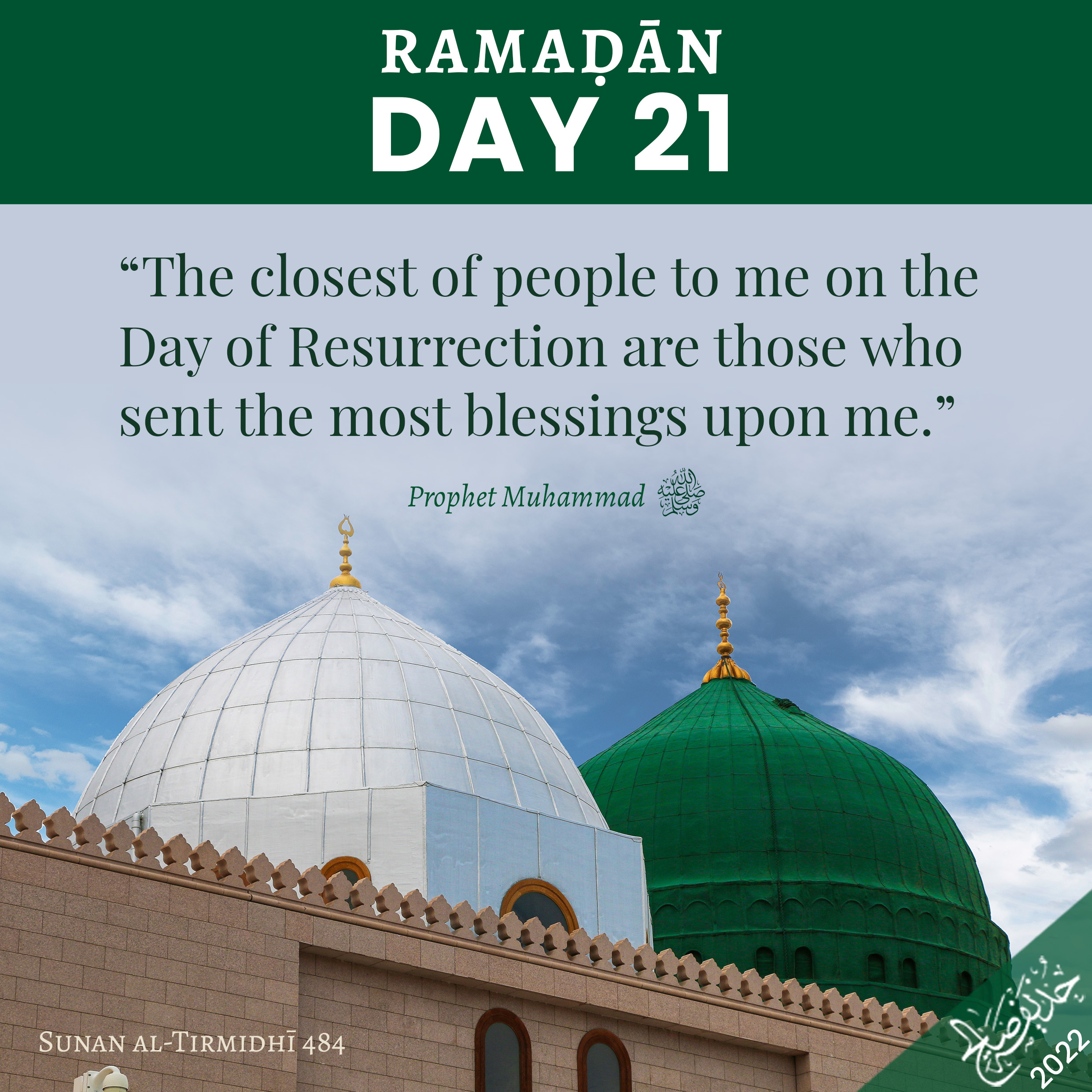
The Prophet ﷺ said,
مَنْ صَلَّى عَلَىَّ صَلاَةً وَاحِدَةً صَلَّى اللهُ عَلَيْهِ عَشْرَ صَلَوَاتٍ وَحُطَّتْ عَنْهُ عَشْرُ خَطِيئَاتٍ وَرُفِعَتْ لَهُ عَشْرُ دَرَجَاتٍ
“Whoever sends blessings upon me once, Allāḥ will send blessings upon him tenfold, and will erase ten sins from him, and will raise him ten degrees in status.
[Ibn Mājah and others]
One blessing and mercy from Allāh is sufficient for the whole creation, let alone ten of Allāh’s blessings in return for invoking blessings once. What virtue for invoking blessings is there which is greater than being granted ten blessings for invoking once?
In Zād al-Saʿīd, it is narrated from Al-Mawāhib al-Ladunniyya that on the Day of Judgement, a certain believer will have fewer good deeds. The Prophet ﷺ will place a parchment the size of a fingertip on the Scales. The pan of good deeds will become heavy.
The believer will say, “May my parents be sacrificed for your sake. Who are you? How beautiful your appearance and character are!”
The Prophet ﷺ will reply, “I am your Prophet and these are the blessings you invoked upon me. I have recompensed you in your time of need.”
One should not doubt that a parchment the size of a fingertip can weigh down the Scales, because it is sincerity which is of value to Allāh. The more sincerity in an action, the more it shall weigh.
[Virtues of invoking blessings and peace on the Noble Prophet ﷺ, Sheikh-ul-Ḥadīth Mawlāna Muḥammad Zakariyyā Kāndhalawī رحمه الله, Page 18, 38]اللهم صل على محمد و على آل محمد كما صليت على إبراهيم و على آل إبراهيم إنك حميد مجيد، اللهم بارك على محمد و على آل محمد كما باركت على إبراهيم و على آل إبراهيم إنك حميد مجيد

In order for our duʿā to be answered, it is necessary that one appears before Allāh تعالى as weak, helpless and simply unable to hold on his own; modest and humble and submits to Allāh تعالى with total negation of what is supposed to be pride, dignity, honour, ego and then makes duʿā.
Duʿā is a thing of the soul which requires that its words match the feebleness and humbleness of the soul of the maker of that duʿā.
Allāh تعالى is All-Hearing (السميع), All-Knowing (العليم). Allāh تعالى knows what we show on the outside and what we hide on the inside. Allāh تعالى hears everything said quietly or loudly.
Therefore, when the voice of the Companions رضي الله عنهم reached a loud pitch during duʿā made on the occasion of the battle of Khaybar, the Messenger of Allāh ﷺ said:
You are not calling someone dead or absent that you say it in such a loud voice. Instead, your addressee is someone Hearing and Near, that is Allāh تعالى (so, to raise your voice is redundant).
Allāh تعالى has mentioned the duʿā of a righteous person in these words:
ذِكْرُ رَحْمَتِ رَبِّكَ عَبْدَهُ زَكَرِيَّا
إِذْ نَادَىٰ رَبَّهُ نِدَاءً خَفِيًّا
This is a mention of the mercy of your Lord to His slave Zakariyah.
When he called his Lord, calling in a lowered voice.
– Qurʾān, Sūrah Maryam (19), Verse 2-3
The state of duʿā liked by Allāh تعالى is that it be asked of Him in a lowered and subdued voice.
[Maʿāriful Qurʾān, Volume 3, Page 691-693]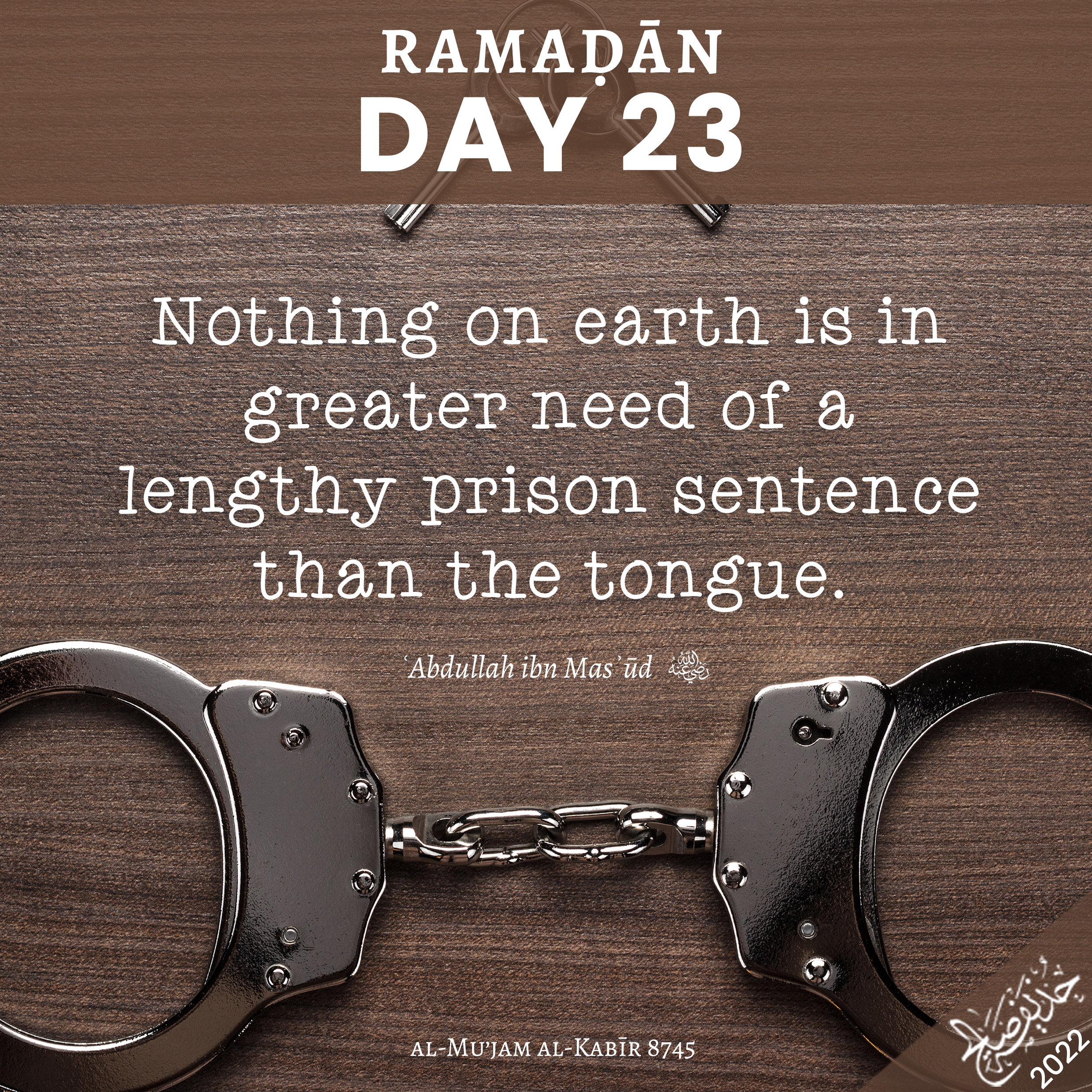
There was once a king who saw in a dream that all his teeth had fallen out. He called a dream-interpreter, told him what he saw in the dream, and asked him to interpret it. When the interpreter heard the dream, his complexion changed and he began to repeat, “Allāh’s refuge is sought! Allāh’s refuge is sought!” The king became worried and asked, “What is the interpretation of my dream?” The interpreter said, “After many years pass, your wife and children will die and you will be all alone in your kingdom!” The king screamed, became furious, and began to hurl abuses and insults. He then ordered that the interpreter be imprisoned and called another interpreter, related to him what he saw in the dream and asked him for its interpretation. The dream-interpreter smiled and said, “Glad tidings, dear king!” The king said, “What is the interpretation of the dream?” The interpreter said, “It means that you will live for very long – so long that you will be the last of your family to die, and you will remain a king your entire life.” The king became very pleased, showered him with gifts and remained content with him whilst angry with the first dream-interpreter.
If you contemplate, you will realise that both of the interpretations were the same, the difference was in the way in which the interpretation was conveyed. Hence, the tongue is the master.
A person may utter a callous word that displeases Allāh for which He will be angry with him until the day He meets him. This is why the Prophet ﷺ warned people regarding not controlling the tongue as it may lead to one’s own destruction.
The Prophet ﷺ said, “When the son of Ādam wakes up in the morning, all of his body parts humble themselves in front of the tongue and say, ‘Fear Allāh for our sake! Our wellbeing depends on you. If you remain upright, so shall we. If you become crooked so shall we.’”
(Aḥmad, Tirmidhī)
Ibn al-Jawzī رحمه الله said, “It is amazing how many people are strong enough to abstain from consuming unlawful wealth, fornication and theft and yet you are unable to abstain from moving their tongues. You will see such people speaking ill of others and unable to prevent themselves from doing so.”
Use the various modes of speech that would move people’s emotions. Speak to your mother in a soft tone and by using the most beautiful words, and the same goes to your father, husband/wife, children and colleagues. Speaking in this manner would not cost you anything but would enchant those you speak to and get rid of any ill feelings they may have for you.
Animals have long tongues, yet they cannot speak, Man has a relatively short tongue, yet he cannot keep silent.
[Enjoy your life, Dr. Muḥammad ʿAbdur-Raḥmān Al-ʿArīfī]

Be not hasty and rushed for things that have yet to come to pass. Do you think it is wise to pick fruits before they become ripe? Tomorrow is non-existent, having no reality today, so why should you busy yourself with it? Why should you have apprehensions about future disasters? Why should you be engrossed by their thoughts, especially since you do not know whether you will even see tomorrow?
The important thing to know is that tomorrow is from the world of the unseen, a bridge that we do not cross until it comes. Who knows, perhaps we might never reach the bridge, or the bridge might collapse before we reach it, or we may actually reach it and cross safely.
For us to be engrossed in expectations about the future is looked down upon in our religion since it leads to our having a long-term attachment to this world, an attachment that the good believer shuns. Many people of this world are unduly fearful of future poverty, hunger, disease, and disaster: such thinking is inspired by the devil.
الشَّيْطَانُ يَعِدُكُمُ الْفَقْرَ وَيَأْمُرُكُم بِالْفَحْشَاءِ ۖ و اللهُ يَعِدُكُم مَّغْفِرَةً مِّنْهُ وَ فَضْلًا ۗ و اللهُ وَاسِعٌ عَلِيمٌ
Satan threatens you with poverty and orders you to immorality, while Allāh promises you forgiveness from Him and bounty. And Allāh is all-Encompassing and Knowing.
[Qur’ān, Sūrah Baqarah (2), verse 268]
Many are those who cry because they see themselves starving tomorrow, falling sick after a month, or because they fear that the world will come to an end after a year. Someone who has no clue as to when he will die (which is all of us) should not busy himself with such thoughts.
Since you are absorbed in the toils of today, leave tomorrow until it comes. Beware of becoming unduly attached to future prospects in this world.
[Don’t be Sad, Dr. ʿĀ’iḍ al-Qarnī, Page 40-41]
Dear Allah,
You have blessed me with this blessed month, a month which many did not live to see. You granted me another opportunity to get closer to You. Though throughout the year I went on chasing the dunya, You brought this month to allow me to realise where my heart really belongs – with You.
Oh Allah, I have sinned and I continue to sin, but You are all forgiving. I am a begger in Your court, asking for Your pardon. Please forgive me.
Oh Allah, I face trials like everyone else, but found solace in Your words – ‘Indeed, after hardship comes ease’. I found comfort in the way shown by Your Prophet (peace be upon him). I read his biography and the tests he faced – my difficulties were no longer worth mentioning.
Oh Allah, I lost my path many times. I wandered afar often succumbing to my desires and the whispers of the devil, but I held Your book as my guide and You showed me the light – this religion.
Oh Allah, I am sorry. I know I forget You when I am awake, and You remember me when I am asleep. I forget You when I laugh, You remember me when I cry. I forget You when I love, You remember me when I hate. I forget You when I eat, You remember me when I am hungry. I forget You when I speak, You remember me when I am silent. I forget You when I am angry, You remember me when I am patient.
But please, Oh Allah, don’t forget me when I die and enable me to remember You now whilst I am alive.
Yours sincerely,
A striving soul

There was a man of strong and dignified bearing amongst the Syrians who used to visit Ḥaḍrat ‘Umar رضي الله عنه. When he did not show up for longer than the usual period of time, Ḥaḍrat ‘Umar رضي الله عنه inquired about him. People said, ‘Yā Amīr-ul Mu’minīn رضي الله عنه, please don’t ask about him, he has become a drunkard.’ Ḥaḍrat ‘Umar رضي الله عنه called his scribe and dictated a letter to him in which he said:
‘From ‘Umar (رضي الله عنه), son of al-Khattāb to _, son of _, peace be upon you. After that, I praise Allāh before you. Other than whom there is no God worthy of worship. He is the One who forgives sins and accepts repentance, the One who is severe in punishment, the One who is the source of all power. There is no God but He. To Him is the ultimate return.’
–
Then he turned towards those around him and said ‘Let us all join in to pray for him that Allāh reverses his heart and accepts his repentance.’
Ḥaḍrat ‘Umar رضي الله عنه instructed the messenger to not hand the letter over until the man was sober. And he was to not hand it over to anyone except to whom it was intended for. So, when the person received the letter, he read it repeatedly and thoughtfully whilst realising that it carried a warning of punishment against him with a concurrent promise of forgiveness for him. Then he started weeping. Finally, he stopped drinking and made such a firm taubah that he never touched it again.
When Ḥaḍrat ‘Umar رضي الله عنه learnt about the effective manifestation of these words, he said to the people around, ‘In such matters, you too should do the same. When some brother falls into some slip of conduct, think of a way to bring him back to his normal and better self. Prompt him to turn to Allāh, to place his trust in Him, to rely on His mercy. Pray to Allāh for him, pray that he is able to repent and make his taubah. And do not become an accomplice of satan against him [that is if you chide him or infuriate him and thereby enstrange him from his religion, then, you would actually be helping satan].’
[Ma’āriful Qur’ān, Volume 7, Page 588-589]
The ʿabd (of Allah) is then ordered to stand with his face in the direction of the qiblah all the while having his heart facing Him as well (being fully attentive to Him) so as to renounce his previous state of rebellion and to stop turning away (from his Lord).
The slave (of Allah) should therefore stand up before his Master in humility and submission calling for His Compassion with his hands thrown at his sides and his head low, while at the same time his heart is fully attentive to Him in a state of humility, as he devotes all his senses to His service and glorification by declaring with his tongue and proclaiming in his heart that He is the Greatest, which is to express that Allah is greater than anything he may have in his heart. And he affirms this statement by dismissing everything except Allah from his heart so his heart is completely occupied with Allah and nothing else. This is because occupying himself with anything else would connote that he finds what he is busy with is of more importance or greater than Allah.
Indeed, a person whose heart is busied with what distracts him from Allah (in ṣalāh) is someone whose heart does not conform to the statement made by his tongue declaring Allah is the Greatest. Having the heart in harmony with the tongue when saying that Allah is the Greatest will strip the heart from the attire of arrogance as such garment does not befit the state of his enslavement to Allah. Furthermore, it would prevent the heart from thinking of anything except Allah. This is because the rights of these two words; Allah is Greater than everything, and the resolve to establish his servitude to Allah through the takbīr protects the heart from the aforementioned defects (being occupied with something else other than Allah and wearing a garment that does not befit the servitude to Allah).
[Inner Dimensions of the Prayer by Imām Ibn Qayyim al-Jawziyyah]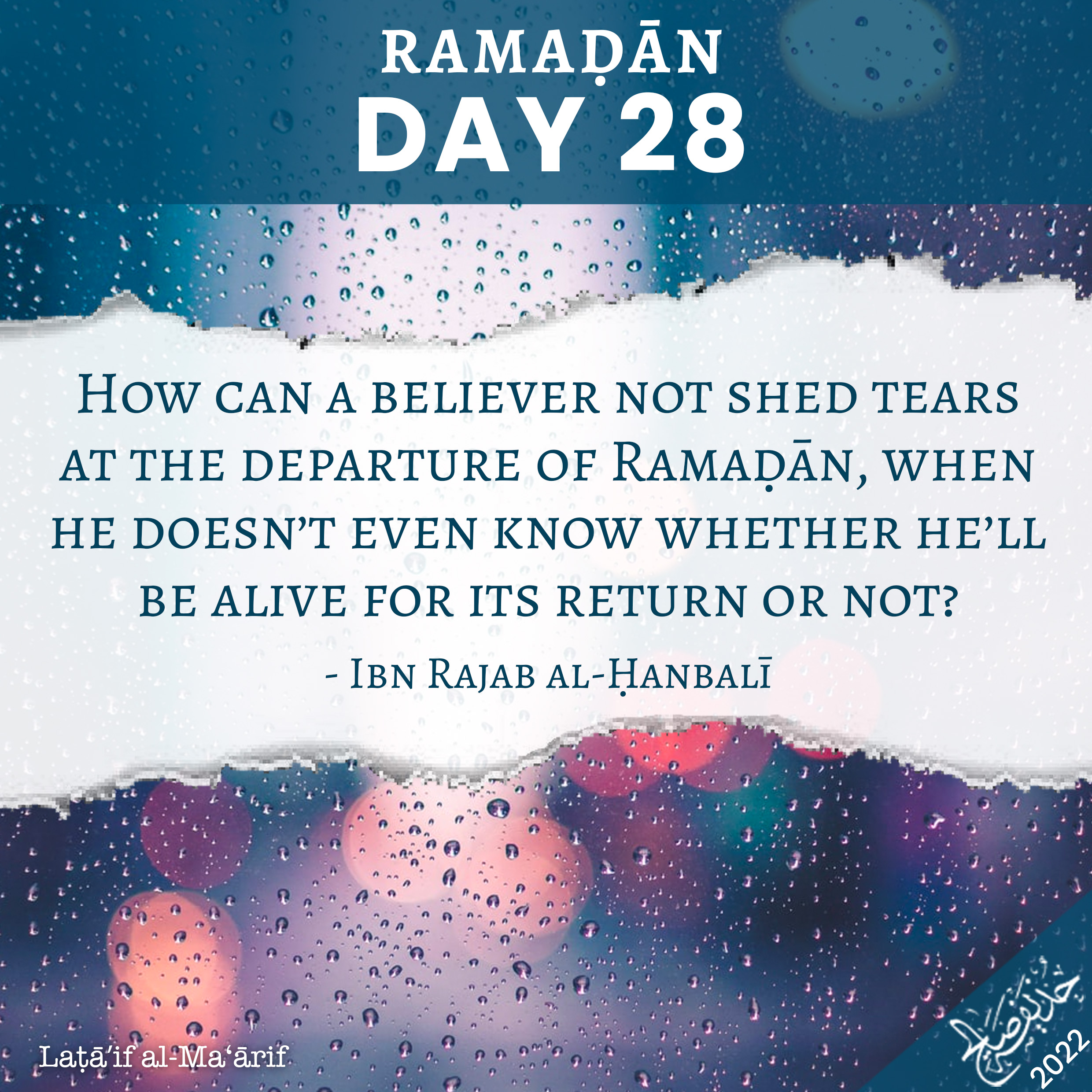 A couple of days remain of this blessed month. We anticipated it like the coming of a new beginning. We prepared our souls for spiritual nourishment in the absence of food and drink. But we found ourselves weak. We did not meet our goals. We may have not spent as much time with the Qur’ān as we may have wished. We may have slept through the times of Qiyām ul-Layl. We found ourselves weak in seeking His mercy.
A couple of days remain of this blessed month. We anticipated it like the coming of a new beginning. We prepared our souls for spiritual nourishment in the absence of food and drink. But we found ourselves weak. We did not meet our goals. We may have not spent as much time with the Qur’ān as we may have wished. We may have slept through the times of Qiyām ul-Layl. We found ourselves weak in seeking His mercy.
Now is not the time to cry over spilt milk, nor the time to console ourselves with the anticipation of the next Ramaḍān.
Reflect on this wonderful statement by Imam Ibn Rajab (Allah have mercy on him) in his Laṭāʾif:
“Let those who have failed to make the most of this month of Ramaḍān end it with good because actions are judged by their endings.”
 Look at life with a spirit of love and optimism, for life is a gift from Allāh to man. So accept this gift from the One, take it with joy and embrace the morning with its glow, the night with its quietness and the day with its brightness.
Look at life with a spirit of love and optimism, for life is a gift from Allāh to man. So accept this gift from the One, take it with joy and embrace the morning with its glow, the night with its quietness and the day with its brightness.
Drink this fresh water with gratitude, breathe this fresh air with joy, smell the roses and glorify Allāh.
Think about the universe and learn from it, make use of the blessed gift of land, the beautiful flowers, the sweet air, the delights of the garden, the warmth of the sun, the light of the moon.
Let these blessings motivate you to obey Allāh, the Exalted, give thanks to Him and praise Him for His endless blessings and bounty.
Do not let worry and distress prevent you from being grateful for these blessings and make you ungrateful; rather, remember that the Creator and Provider has only created these blessings as a means to help you obey Him.

As the month of Ramaḍān comes to an end, the question most of us are probably thinking right now is “How do I know if my Ramaḍān was accepted by Allah?”.
There isn’t a 100% guaranteed way to tell exactly how much of our worship was accepted, but there is a pretty good indicator that can help you find out.
And that is Istiqāmah (steadfastness). In other words, if we’re able to continue the good actions we picked up in Ramaḍān well after this month – that would be a major sign that our deeds were accepted. And likewise, if we’re able to refrain from the sins we usually indulge in, well after Ramaḍān – that would be a major sign that our deeds were accepted.
May Allah make us amongst those who carry the light of Ramaḍān throughout the year, and remain steadfast in His worship with ikhlāṣ (sincerity) and acceptance. May He pardon the deficiencies in our ʿibādah and allow us to witness the next Ramaḍān. Āmīn Yā Rabb.



